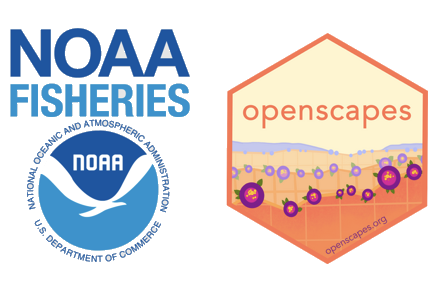2021 Fall NMFS
NMFS Openscapes Fall 2021 planning team: Eli Holmes (NWFSC), Eric Ward (NWFSC), Helene Scalliet (NWFSC).
from the Openscapes blog post
This cohort was an opportunity for NOAA staff to explore and practice open data science approaches, but it was also an opportunity to meet and build relationships with staff from different fisheries science centers. It was exciting to see participants discuss common pain points and learn from each other about strategies that could be reused across centers. Discussion topics included strategies to help diverse teams develop strategies for using GitHub together and organizing R code, as well as articulating differences between final NOAA products vs ongoing work/projects and how open science relates to both.
Many topics/themes that resonated with the 2021 NOAA NMFS Cohort overlapped and reinforced each other. Here are a few examples:
Documenting onboarding & offboarding processes. Investing time to formally document onboarding and offboarding processes (for federal employees as well as contractors) was a big topic. Both are important to capture institutional knowledge and critical to prepare both for folks leaving their positions and for new folks joining the team. Written documents help others get up to speed faster, and find available datasets, data description guides, and methodologies. It’s critical that they are easily accessible and updatable “living documents” for core or team processes that may occur infrequently.
GitHub projects. While multiple tools for project collaboration and management exist, this cohort was particularly enthusiastic to learn more about Github projects. The cohort noticed that Github projects are easily used by team members who have different skill sets, job titles, and areas of expertise. Teams started offering other ways to contribute, including discussion boards, Github issues, and Slack. These tools enable asynchronous collaboration that goes “beyond the meetings” and can improve hybrid working conditions. GitHub’s Project Boards{beta} were release just as our cohort ended and Paul McElhaney (NWFSC) shared examples of how it could be used by NOAA teams. Some potential uses for GitHub Projects included:
Strategies for community building. Collaboration is essential within teams and with external partners, but collaborating with people around new technology is challenging and takes time. Discussing next steps for carrying this work forward, one participant summarized it as “not just skills, also culture”, and that helping folks get excited is worth the effort. Strategies included show-by-doing (screensharing), co-working, office hours, and bringing down silos of people who are used to working with (beyond job titles). This includes sharing work earlier (not waiting for work to be perfect-ish before sharing) and building better shared relationships with Google folders.
Participating teams
The NWFSC Eco/Stock Assessment Team is a cross-divisional team (FRAM, CB and FE divisions) at NWFSC. The team’s will be working on analyses and visualization of fisheries-dependent and -independent data to inform both groundfish stock assessments and integrated ecosystem assessments (IEA). Potential projects include 1) analysis of ecosytem drivers and associated responses, 2) estimation of species-specific habitats in the context of fishing gear utilization, 3) incorporation of ecosystem considerations into stock assessments, 4) visualization of IEA indicator distributions and trends, and/or 5) development of a strata explorer app.
The NWFSC FEAT Team is from the Fisheries Resource and Monitoring division at NWFSC. This team will focus on streamlining data tracking/sharing/processing within the Fisheries Engineering and Acoustic Technologies (FEAT) team, as well as improving onboarding/offboarding of personnel, coordinating Pacific hake biomass calculation dataflow for stock assessors, MSE, and other interested parties. GitHub Org
The NWFSC Protected Salmonids Team is from the Conservation Biology division at NWFSC. This team will be working on improving data workflow related to protected PNW salmonids. We will be focusing on more robust data workflows: 1) better data tracking, 2) personnel on-boarding systems, 3) loss of critical connections with our diverse data partners when staff retire or leave, and 4) implementing more automated data workflows. Team members are from the Mathematical Biology and Systems Monitoring Program working on the PNW Viability Reports that support the WCR Status Reviews for endangered and threatened salmonids and from the Genetics and Evolution Program working on the salmon bycatch RM&E program in the west coast groundfish fisheries. GitHub Org
The NWFSC WRAP Team is a cross-divisional team from the Fish Ecology and Fisheries Resource and Monitoring divisions at NWFSC. This team is working to coordinate sharing of data for marine ecosystem or life cycle modeling projects.
The AFSC Team is from the Resource Assessment and Conservation Engineering (RACE) division at AFSC. This team will be working improve data, code and report workflows for survey data. Data: curation, processing and dissemination, including implementing continuous integration. Code: improving collaboration on code packages survey data processing and prep, streamlining code development and sharing. Reports: automating reports, collaborating on proposal writing, and automating standard data products. GitHub Orgs: afsc-gap-products with onboarding page.
The SEFSC Team is part of the SouthEast Data, Assessment, and Review (SEDAR; http://sedarweb.org/) in the Sustainable Fisheries division at SEFSC. This team will be working on improving data workflow, automating reports, and collaborating on packages and functions for assessment model output and diagnostics for Southeast stock assessments for the Gulf of Mexico, Caribbean, and Atlantic.
The NEFSC Team in part collects fisheries dependent data in collaboration with the fishing industry. These data can be underutilized, in part due to their complex nature, and this complexity creates challenges for their use in reproducible research products. The team is interested in strengthening open science approaches to increase the value of these data by opening the door to new users who have previously been unable to use the data sets due to their complex nature.
Openscapes cohort leads: Julie Lowndes, Openscapes founder and co-director, NCEAS, UCSB, lead; Eli Holmes, NWFSC Mathematical Biology and Systems Monitoring Program, co-lead; Corey Clatterbuck, Seagrant Fellow at the California Water Boards Office of Information Management and Analysis, assisting
